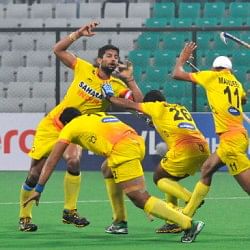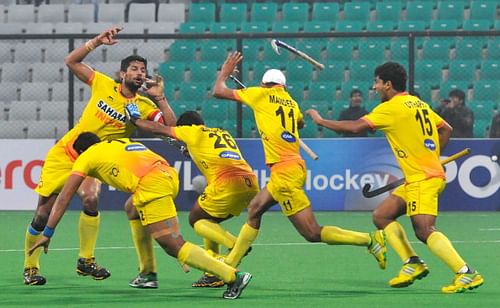
A case of so near, yet so far for Indian Hockey at the Hockey World League Final

Rupinder Pal (L) of India celebrate with team after score winning goal against Germay during the Hero Hockey World League Final, Ranking match at National Stadium on January 17, 2014 in New Delhi, India.
“Of all sad words of tongue and pen, the saddest are those that might have been.”
This memorable adage could be applied to India’s participation in the inaugural FIH Hero Hockey World League Final 2014, which concluded this past Saturday at the Major Dhyan Chand National stadium in New Delhi. In their last Pool A league match against Olympic and European champions Germany, India gave a spirited display and led 3-2 until two minutes before the final whistle.
Ironically, India’s best player and skipper Sardar Singh could not trap a stinging drive from a German player, and allowed 26-year-old German midfielder Thilo Stralkowski who trapped it and equalized with a prompt shot past Sreejesh. The match ended in a 3-3 draw, but if India had held on for two more minutes and won this encounter, they would have finished third in their group and avoided the rampaging Australia and instead played Argentina who ultimately finished last.
A victory in the quarter finals against Argentina was possible and Terry Walsh in his first assignment as India’s coach could have guided the team to the last four which would have been a memorable achievement. Playing the mighty Aussies was an uphill task for India. The Major Dhyan Chand stadium is a happy hunting ground for Australia; at this venue they won the 12th World Cup and the gold medal at the 19th Commonwealth Games in 2010.
Australia has always trounced India at this venue; in the 12th Hero Honda FIH Hockey World Cup (Men), India lost 1-5 to Australia in their group A league match. Months later in the Commonwealth Games, India lost 2-5 to the Aussies in their league encounter and were humiliated in the final 0-8 by the same opponents.
So when India took on Australia on 15 January in the quarter-finals of the inaugural Hero Hockey World League Final, the result seemed a foregone conclusion. Yet the 4,000 odd spectators who defied the cold in Delhi to witness this late night match rubbed their eyes in disbelief when India led 2-0 within the first 11 minutes of play, with an initial own goal from the Aussies and a second from Yuvraj Walmiki. It was a battle of two Australian coaches – Walsh for India against his legendary former teammate Ric Charlesworth.
Stung by this reversal, Australia increased the tempo of the match, attacked in waves, tackled ruthlessly and in a span of 10 minutes, scored three goals to lead 3-2 at half time. India crumbled in the second half and lost 2-7. Analysing the match, Walsh later said the difference was in physiology. He said the Australians with better physique, fitness, speed and stamina outran India. They pressed in midfield and India crumbled, as their ball retention declined and they conceded possession with inaccurate passes. The physical dominance of Australia is haunting India and that’s why a match against Argentina would not have been so daunting.
Commenting on the match, Charlesworth said Australia had been in such situations (trailing early in a match) and changed their approach play to dominate the match. He felt that India did not know how to play for a win, change their approach play and retain possession. This inconsistency in India’s approach play was evident in the classification match too against Belgium. India led 1-0 until the 68th minute, but then conceded two quick goals to lose 1-2 and finish sixth overall.
India played six matches in this new tournament, lost four, drew one and won once. Statistically it does not look impressive. However after the abyss of finishing 12th and last in the 2012 London Olympics, there is a glimmer of hope for Indian hockey. Despite finishing sixth in an eight team tournament, India gained crucial ranking points. Thus India improved their world ranking to No. 7 from No. 10. The last time they were ranked so high was eight years ago in 2006. Other glad tidings were that 18-year-old Mandeep Singh, who scored a fine hat-trick in the 5-4 win against Germany in a classification match, was chosen the Best Young Player of the FIH Hockey World League.
The German team was not well prepared due to the winter break and had played mostly indoor hockey before coming to Delhi. However, they had some outstanding players like skipper Oliver Korn, FIH Player of the Year 2013, defensive midfielder Tobias Hauke, Oskar Deecke and Benjamin Wess, so India’s victory was creditable.